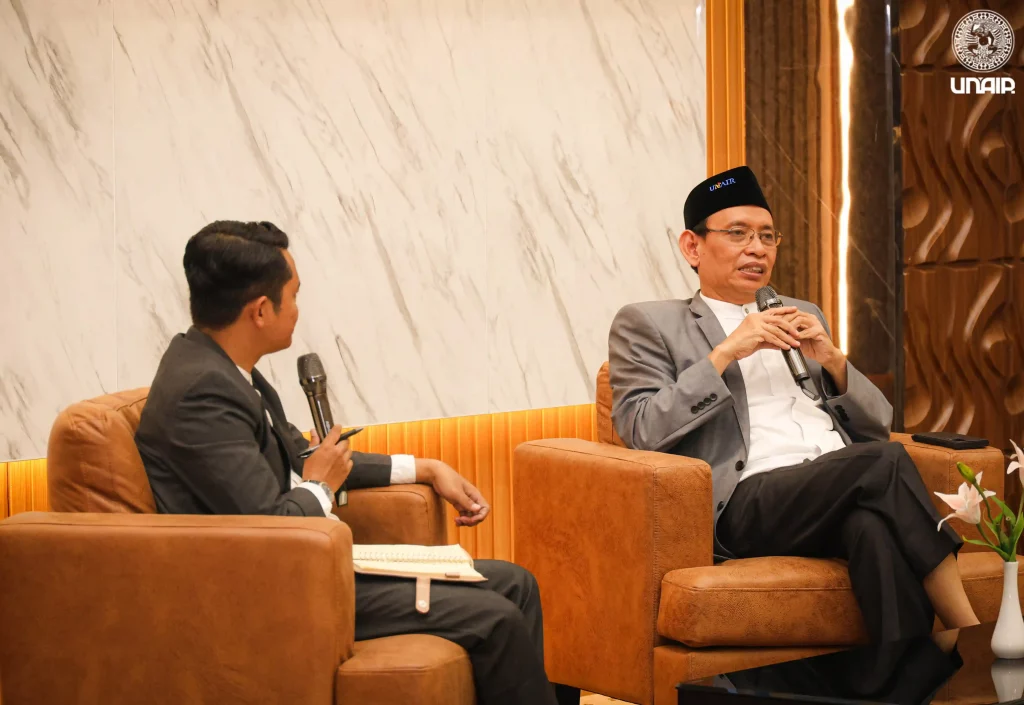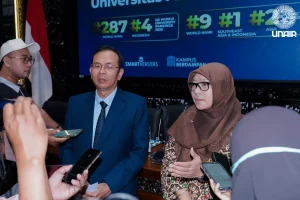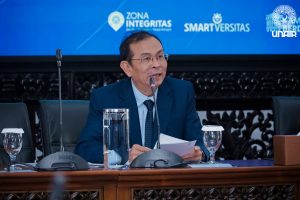UNAIR NEWS – The Postgraduate School of Universitas Airlangga (UNAIR) has once again partnered with Suara Muslim Radio Network to host a Ranah Publik public discussion. The latest forum, titled “UNAIR Impact for Just and Civilized Indonesia,” was held on Friday, May 16, 2025, in the first-floor hall of the Management Building at UNAIR’s MERR-C Campus.
The event featured UNAIR Rector, Prof. Dr. Mohammad Nasih, MT, Ak, CA, as the main speaker. Prof. Nasih shared that he had no lofty ambitions when he first assumed the role of rector, explaining that the position came to him through circumstance rather than personal desire. His main goal, he said, has always been to ensure that UNAIR contributes wherever and whenever society needs it most.
“A university is remembered not for its name, but for the extent of its real-world impact,” he said. “If UNAIR is to be recognized, it must provide value. It must serve the public good and deliver meaningful benefits to society.”
HEBAT: UNAIR defining values
To guide the university’s contributions to society, UNAIR has adopted a core values framework known as HEBAT—an acronym derived from the principles of Excellence with Morality. Prof. Nasih explained that the concept was simplified into five values so the entire academic community could easily understand and apply them. These values are: Humble–Honest, Excellent, Brave, Agile, and Transcendent.
“Humility is vital because it opens the door to knowledge. If you think you know everything, you’ll struggle to learn something new,” he said. “Honesty, helping others, and the courage to take risks are equally important.”
He added that courage should not be mistaken for simply being outspoken—it also means being ready to confront challenges through research and innovation. He cited UNAIR’s swift response during the COVID-19 pandemic, including vaccine development, as a prime example. The final value, Transcendent, he noted, serves as a reminder that all efforts should ultimately be entrusted to God.
Research must be accessible and impactful
Prof. Nasih stressed that the value of research lies not just in its results, but in how effectively it reaches and benefits the public. Publishing findings is, therefore, a critical part of the academic process. He encouraged UNAIR’s faculty and students to actively share their research through journals and media outlets like Suara Muslim Radio Network.
“When an article is published in a journal, it can reach thousands and be cited by others, which increases its impact significantly. That, too, can be seen as a form of good deeds,” he explained.
He also emphasized the importance of preparing UNAIR graduates to be both academically strong and competitive in the job market. “Graduates shouldn’t become a burden on society. They must be independent and capable of creating jobs—not just seeking them,” he added.
Collaboration as foundation of institutional growth
When it comes to building UNAIR’s reputation, Prof. Nasih said there is no secret formula. The university’s progress—both nationally and globally—has been achieved through shared efforts and collaborations. He also called on the public not to judge development solely by new buildings but to recognize the university’s ongoing investments in human capital.
In a closing statement, Prof. Nasih reaffirmed UNAIR’s dedication to delivering real, lasting contributions to society. “UNAIR must be present and impactful—bringing the greatest possible benefit to life, the environment, and humanity as a whole. That is our collective commitment, and we will continue to uphold it,” he concluded.
Author: Fania Tiara Berliana Marsyanda
Editor: Ragil Kukuh Imanto









